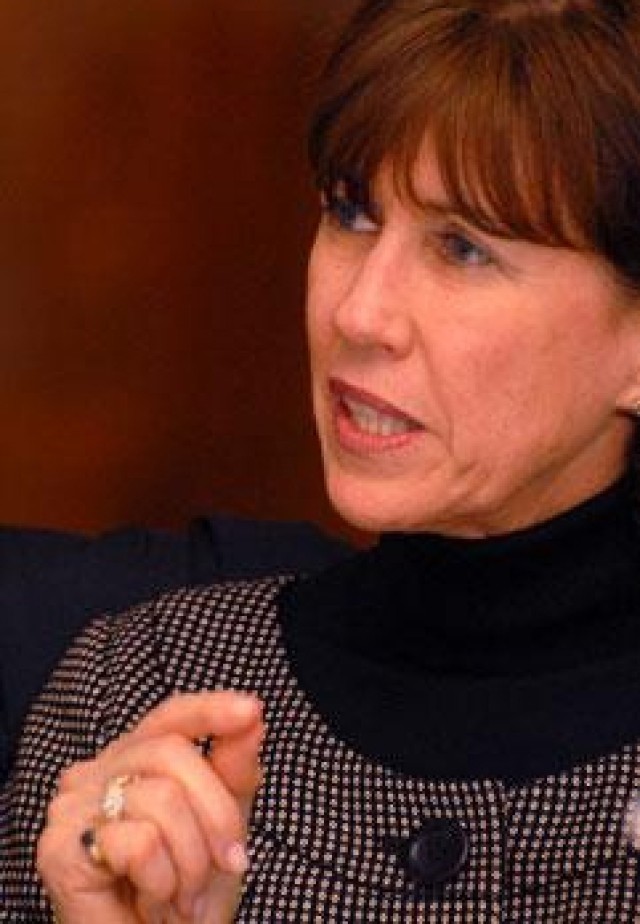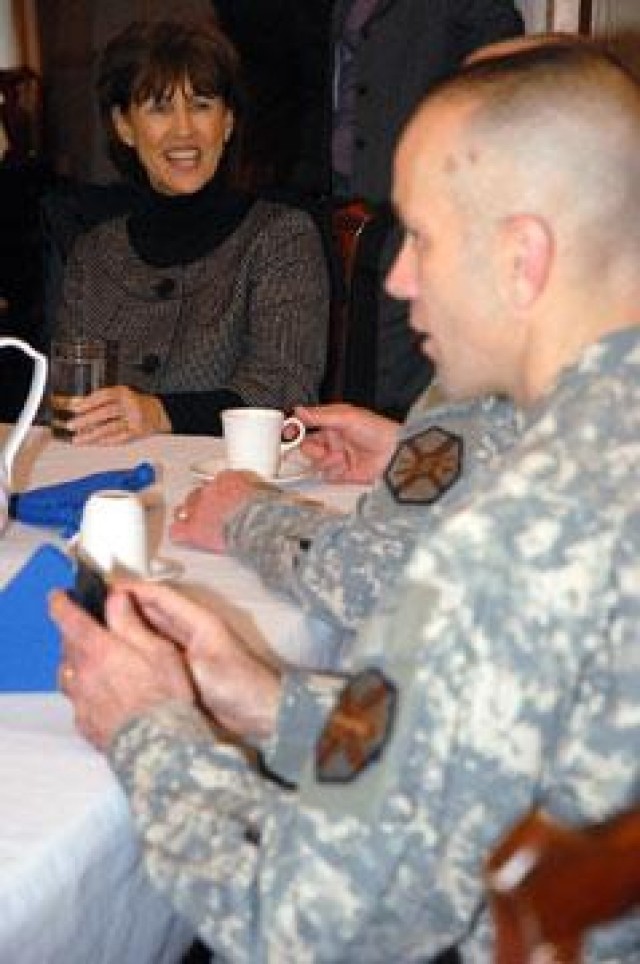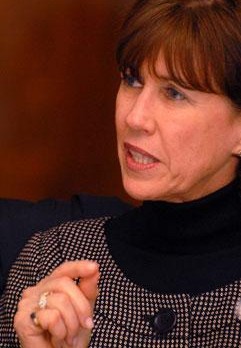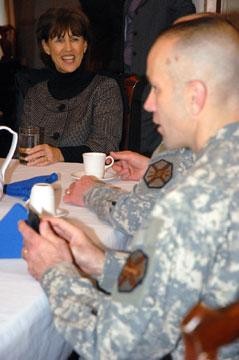FORT LEAVENWORTH, Kan. (Army News Service, April 4, 2008) - The chief of staff of the Army and his wife visited Fort Leavenworth March 27 to talk to address students in the Pre-Command Course, along with their spouses, and the Army's senior spouse took the opportunity to talk about the state of Army Families.
Sheila Casey, wife of Gen. George W. Casey Jr., has been a military spouse for more than 35 years. Their assignments have taken them to Europe, Egypt and throughout the United States.
Mrs. Casey works as the chief operating officer of "The Hill," a newspaper that reports on Congress. She is also a member of the Board of Governors of the National Military Families Association, a nonprofit organization that is the voice for military families.
<b>Fort Leavenworth Lamp: How important is the role of the military spouse'</b>
Mrs. Casey: It is huge. I say that because we have a saying, "You recruit the Soldier, but you retain the Family." I don't think that it's ever been truer than it is today. What we've realized is that the Family is a readiness issue. It is very important that as a Soldier, especially going off on a deployment, that his or her family is being taken care of so that they can go off and do their job.
<b>Lamp: What advice would you give to spouses who are new to the Army Family'</b>
Mrs. Casey: I would tell them to get involved with their Family readiness groups. Sometimes it's very hard to capture those (new) people - they may be living away from the post, you may not know that a Soldier is married. So I would say, "Come in, join these groups and learn what's available." Even with all these programs and everything that we have, our best resource is each other. We've been through this. I think that spouses really help other spouses, and we depend on each other to get through these times.
<b>Lamp: You meet a lot of Army Families. What's the morale of Families today'</b>
Mrs. Casey: The morale is good. They are a very committed group of people. They are stressed and they are stretched. We have realized since we've traveled around that they really are the most brittle part of the force. But even through that, they are incredibly resilient. I have concerns about the continued deployments because I think that the compounding of the stress of a spouse coming and going is very difficult. Some are on deployment number four. All of those things add up. One issue I'm particularly concerned about is our children because we do not know, yet, what the cumulative effects of these deployments are on our children. That is something that we have to watch very, very closely, and making sure that there is help and support for them as well.
<b>Lamp: What are some of the immediate effects of the Army Family Covenant that you've seen since it was signed in October'</b>
Mrs. Casey: What I've seen and what I've heard is that people have felt the immediate impact of the money coming down. This year, $1.4 billion is going toward Family programs and next year, $1.7 billion. The changes that people have seen are increases in child care centers, increases in respite hours for Exceptional Family Member Programs, increases in child care hours, they have done away with many registration fees not only for child care centers, but many youth programs as well.
<b>Lamp: What do you see coming down the pike for Army Families from the covenant'</b>
Mrs. Casey: We are putting Family readiness support assistants down through the brigade level. Those are paid positions to help with the Family readiness groups, which is very important. The Army is trying to hire about 200 counselors to help with mental health, and that's another big issue that's very important to Families.
<b>Lamp: What else needs to be done for Families'</b>
Mrs. Casey: We have to improve on a lot of things. We need to work on educational issues for spouses and for families. We need to continue to do work on spouse employment programs because you have some 60-odd percent of spouses (who) are in the workforce. As you move, it becomes very difficult to find jobs. We have to continue to help spouses find employment or to have careers that they can transfer from place to place. And, housing - that's continuing to change and improve as well.
<b>Lamp: You've been a military spouse for more than 35 years. What are some of the major improvements that you've seen in Army Family life'</b>
Mrs. Casey: It's so big when I think back. Let's take Army Community Service. When George first went into the Army, ACS was a lending closest - you went there to get an ironing board. Everything was so limited. We didn't have child care centers, we had nurseries where you could drop in and do a little hourly care. There was no network to inform people what was going on at the unit or how things worked. There really weren't many services, but again, we had each other.
<b>Lamp: Is there anything else that you would like to add'</b>
Mrs. Casey: I would like to emphasize the continual need to think about these Families and what they are going through. It's very important for the civilian community to get involved and to stay involved with people in the military, especially now because everybody doesn't live on a post. And, you have the Reserve and National Guard, who are spread across the United States and are big parts of their communities. These are times when people need to put their arms around the military Families, which includes the single Soldiers, and contractors and the civilians who are working very hard to keep this machine moving and who are also deploying.
(Jeff Crawley writes for the "Fort Leavenworth Lamp.")




Social Sharing